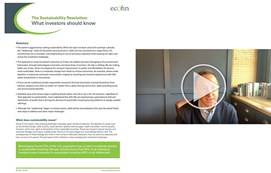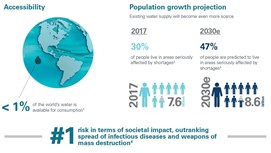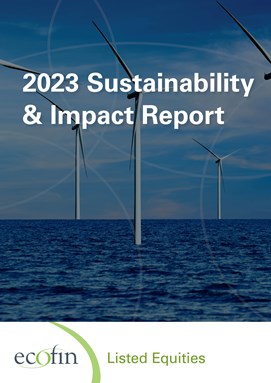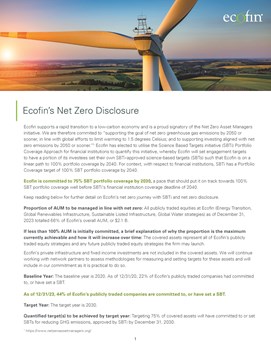1. The EU legislation
The European Union’s regulation on sustainability-related disclosures in the financial services sector forms part of its package of measures relating to Environmental, Social and Governance (“ESG”) issues.
It lays down harmonised rules for ’financial market participants’ on transparency with respect to the integration of sustainability risks and the consideration of adverse sustainability impacts in their processes, and the provision of sustainability-related information with respect to financial products.
Sustainability risks are stated as being an environmental, social or governance event or condition, which, if it occurs, could cause a material negative impact on the value of an investment.
Whilst Ecofin Advisors Limited is not regarded as a ‘financial market participant’ (as it is no longer in the European Union), this document discloses how Ecofin Advisors Limited and Ecofin Advisors LLC (together Ecofin) integrates sustainability risks in its investment decision-making process and, in considering the principal adverse impacts of investment decisions on sustainability factors, sets out its due diligence policies with respect to the same.
In summary, the legislation requiring the transparency of adverse sustainability impacts at entity level requires information on the following to be disclosed, the principles of which are covered in this document:
- Information on policies to identify and prioritise principal adverse sustainability impacts and indicators;
- Description of principal adverse sustainability impacts and actions taken to address principal adverse sustainability impacts;
- Brief summary of engagement policies in accordance with Shareholders Rights Directive; and
- Adherence to responsible business codes and due diligence/reporting, with the degree of alignment with the objectives of the Paris Agreement.
This information will be updated periodically as required.
The investment manager
Ecofin is a sustainable investment manager, dedicated to uniting ecology and finance, with roots dating back to the early 1990s. We utilise ESG investment frameworks, harnessing years of expertise investing in sustainable infrastructure, energy transition, clean water & environmental and social impact—much of which has been driven by explicit domestic and international policies addressing climate change. Our strategies are accessible through a variety of investment solutions and seek to achieve positive impact that align with UN Sustainable Development Goals by addressing pressing global issues surrounding climate action, clean energy, water, education, healthcare and sustainable communities. The team has a strong focus on sustainable investing and a core belief that analyzing a company’s environmental, social and governance (ESG) practices is vital to making an informed investment decision. ESG research is incorporated into the investment process across all strategies.
A big part of Ecofin’s sustainability focus is the allocation of proper resources to the sustainability initiative. Ecofin has a dedicated Head of Impact, Greg Murphy, who has a long history of investment analysis and portfolio management, whose sole responsibility today is the development and reporting of sustainability and impact investing.
Ecofin’s Sustainability and Impact Committee is responsible for the ongoing development of the firm’s ESG framework, our approach to integrating on a consistent basis sustainability and impact factors into investment processes, and for measurement and reporting on progress and activities.
ESG issues are analysed in the normal course of investment research, valuation assessment and decision making by the investment team. Ecofin strongly believes that ESG factor analysis is more effective when it is conducted by the investment team and fully integrated into the investment process, rather than carried out in parallel.
2.Ecofin’s investment strategies for its sustainability-focused financial products
The portfolios that Ecofin manage have environmental objectives, such as clean energy/power networks, sustainable project finance in waste to energy, economic infrastructure, electrification, clean transportation, industrial and building efficiency, and water supply, infrastructure and efficiency.
These are inherent in the various investment products which Ecofin offer, which have the following strategies: energy transition, sustainable listed infrastructure, global renewable infrastructure and global water.
Ecofin’s focus on sustainable investing is led by the belief that companies which actively manage their environmental, social and governance risks are best placed to deliver long-term growth and attractive shareholder returns. A thorough understanding of ESG issues empowers companies to potentially mitigate risks and take advantage of the opportunities resulting from these issues. The research process fully integrates both traditional fundamental analysis and ESG analysis that the investment team believes may affect stock valuations and long-term shareholder value. An important aspect of this approach is that both the traditional analysis and the ESG analysis are integrated and undertaken by the Portfolio Managers and Analysts and not outsourced to a separate investment team. Each company has an assigned analyst who is responsible for all aspects of the research process and for engaging with company management.
As Ecofin manages sustainability-focused investment products, disclosures about the integration of sustainability risks in the Ecofin investment process will also be made, as required, in the relevant funds’ pre-contractual offering documents.
3. Ecofin’s investment process for its sustainability-focused financial products
ESG evaluation is a primary factor in Ecofin’s qualitative analysis; as an investment firm we undertake a detailed ESG evaluation as part of our investment process to select portfolio investments which contribute to our sustainability objectives.
At the core of Ecofin’s stock selection process is the understanding and mitigation of environmental, social and governance risks in an effort to provide better risk-adjusted returns to investors. It is also becoming more evident through formal academic studies that better ESG profiles often deliver better absolute performance, thus underscoring the importance of ESG from both a risk management and value creation perspective.
4. ESG due diligence policies with respect to the transparency of adverse sustainability impacts
As provided above, sustainability is core to Ecofin’s investment strategies and process, with the investment process integrating both traditional fundamental portfolio analysis with ESG factors.
Sustainability due diligence includes benchmarking, including for the UN PRI, of our processes with respect to the United Nation’s Sustainable Development Goals (SDGs). The portfolios Ecofin manages for investment funds are cross-referenced to the following SDGs: 4. Quality Education 6. Clean Water, 7. Affordable and Clean Energy, 9. Industry Innovation and Infrastructure, 11. Sustainable Cities 12. Responsible Consumption and Production and 13. Communities and Climate Action.
Accordingly, as our investment strategies seek positive impact, which align with the SDGs, we consider whether there could be any principal adverse impacts of our investment decisions on sustainability factors.
ESG research is undertaken by the investment team. The team believes that engagement on environmental and social issues is much more powerful when it comes from the person committing the money to the investment, rather than from a separate sustainability team.
ESG criteria are applied as an analytical tool on an on-going basis in assessing any principal adverse impacts of investment decisions on sustainability factors, and conversely how Ecofin’s positive sustainability focus fits with investment decisions.
To this end, the Ecofin team believes that well-managed companies actively managing their ESG risks are more capable of generating superior long-term performance. A thorough understanding of ESG issues empowers companies to potentially mitigate risks and take advantage of the opportunities resulting from these issues. The research process integrates both traditional fundamental analysis with ESG factors. The team believes these analyses may impact and reflect into the company’s overall shareholder returns. Each company has an assigned analyst who is responsible for all aspects of the research process and for engaging with company management, including ESG-related issues.
As part of that process, Ecofin initially looks to apply negative screening in assessing principal adverse impacts of investment decisions on sustainability factors on a fund by fund basis, which could exclude any of the following: (a) companies associated with certain outcomes or controversial activities; (b) companies which have too much of an activity detrimental to sustainability (such as significant, or an increasing, coal power generation); or (c) companies which do not play a role in the development of a sustainable economy.
In addition to the negative screening referred to above, the investment team also thoroughly evaluates the ESG attributes of the companies they are interested in, both for what they deliver and how they deliver it.
In doing so Ecofin can look to assess any of the following matters in undertaking ESG analysis on prospective portfolio investments in considering the principal adverse impacts of investment decisions on sustainability factors:
Environmental: Preservation and enrichment of the world
- Scrutiny on carbon footprint and disclosure (and other greenhouse gas emissions)
- Company’s time horizon for carbon neutrality
- Water use and land use
- Emission and waste reduction programs
- R&D, innovation and thought leadership for sustainability
- CAPEX, maintenance and capital integrity
- Risks linked to stranded assets
- Climate change-related physical risks on assets (fire, weather, droughts, etc.)
- Adverse policy support
Social: Consideration of people, communities, and relationships
- Impact on communities
- Customer satisfaction
- Commitment to safety standards
- Diversity in board, management and employees
- Employee engagement
- Commitment to fair and safe employment practices
Governance: Standards for operating, managing and sustaining a company
- Protection of minority shareholders
- Conflict of interests
- Insider ownership
- Management compensation
- Financial and strategic transparency
- Board independence
- Engagement with management and proxy voting
For example, for companies that generate electricity, Ecofin can look to measure each company’s carbon emissions performance (percent of generation from renewables, coal, natural gas, and carbon emissions per megawatt hour) compared with the relevant domestic grid(s). Ecofin created this proprietary database in association with Carbon Analytics. Country data is sourced from the World Bank or National Energy Information Agencies. Company data is calculated annually using the company’s self-reported generation mix and/or in combination with carbon emissions factoring, depending on the generation type. These measures can also be compared with the relevant benchmark index to compare efficiencies and emissions avoided. This provides a framework for measuring the total specific carbon reduction impact.
As part of our analysis, Ecofin looks to assess how much of a company’s business (such as revenues, capital expenditure or operating income) addresses a particular area of climate change focus; depending on the nature of the underlying investment, this could be derived from their sustainability report, which often provides context on how a company specifically addresses decarbonisation, or intends to reduce greenhouse gas emissions for a power generation business. This enables us to review the carbon footprint and intensity for each investment or potential investment, which is a forerunner to the EU Taxonomy classifications.
In making these sustainability assessments, while Ecofin relies almost entirely on proprietary research prepared in-house, the investment team does utilize some data provided by third parties and a wide array of sell-side research analysts primarily to compare expectations as well as to get timely news, such as Bloomberg New Energy Finance (BNEF), CarbonAnalytics, Sustainanalytics and MSCI’s ESG Insight. BNEF’s data is helpful and important for the team’s understanding of sector and regulatory issues and allows it to identify discrepancies between BNEF, proprietary and sell-side research forecasts/models.
Corporate engagement is also a very important part of our governance analysis. The investment team connects with more than 500 companies per year on these topics and keeps track of progress (or lack thereof) on main engagement commitments. The team ensures that companies are doing what they say they are doing, increasing their accountability, and engages with management on their goals and targets to help prioritize them.
Ecofin believes that shareholders can strongly contribute to the dialogue with a company through proxy voting. The investment team votes on each resolution for every company’s general meeting or proxy and votes in the best interest of shareholders, irrespective of the company’s recommendation. This is especially true for any item that could impact ESG considerations in a negative way, such as matters that could affect corporate governance and climate change, reduce the protection of minority holders’ interests, or lead to management compensation being misaligned with the interests of shareholders. Progress is then tracked against our objectives. In exceptional instances we write to a company’s board to express our views, perhaps in concert with other like-minded shareholders. For strategies where there are strict environmental guidelines, the investment team will divest.
5. ESG evaluation – integration of sustainability risk analysis
In addition to assessing the principal adverse impacts of investment decisions on sustainability factors, as provided above, by way of (1) negative screening, and (2) evaluating the ESG attributes of individual companies, sustainability risk analysis is also a part of stock assessment to identify negative ESG risks. Ecofin’s main focus is on the environmental analysis of any such risks but attention is also given to the social and governance aspects of the companies the team researches.
Each analyst identifies the environmental, social and governance risks, or potential risks, of investments to ascertain the nature of the sustainability risk, as well as its materiality. The primary aim of this process is to assess how each ESG risk can derail or materially impact the underlying investment case of a company.
Some examples of the sustainability risks which the Ecofin investment team can look to evaluate are:
- exposure to fossil fuel production and consumption, emission intensity and the corollary risks of economically impacted assets, facing adverse regulatory/legal decisions, incurring rising operating costs and pollution remediation costs;
- pollution, land/water use and business practice impact on local population health and wellbeing;
- treatment of minority shareholders on issues where important ESG considerations may be present;
- impacts on how technology innovations are adapting to meeting ESG policy goals on climate change, and how those innovations may reflect to shifting relative competitive positioning for a company’s existing assets or operations; and
- management behaviour and track record dealing with important or relevant ESG criteria. This may include transparency and disclosure initiatives but also reflect on specific issues, for example in successful completion of Environmental Impact Studies.










